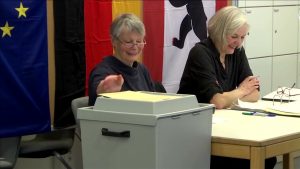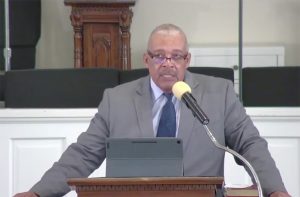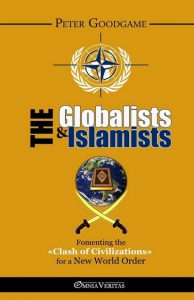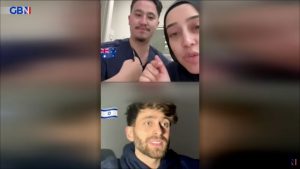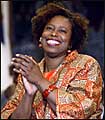A Summary of a Clarion Project Special Report: “NY’s Sharia Patrol”
by Edward Ulrich, updated September 20, 2022

Siraj Wahhaj, who is serving as second in command as the operations director of the New York City Muslim Community Patrol program has many connections to Islamic extremism.
This article is a summary of a special report by Ryan Mauro and Martin Mawyer published by the Clarion Project in October, 2019 that explains recently implemented “Muslim Community Patrols” in New York City have high-level involvement of Muslims who are connected to notorious cases of extremism and violence. The article also details evidence showing that the real agenda of the patrols is to serve as Shaira police for enforcing Islamic law, as is happening in Europe.
Jump to parts of this article ..
Muslims patrols were initially billed as “safety patrols, ” but the message changed quickly
The Muslim Community Patrols are in fact intended to enforce Sharia law
About Siraj Wahhaj’s radical history
About Wahhaj’s “40 Days and 40 Nights” initiative
Wahhaj was arrested for stealing guns from drug dealers who he raided under the pretext of “shutting down their operations”
About Wahhaj’s implementation of his “SSI Patrol Services” in Brooklyn
About Earl Banks (“Ali Mustapha”), the ex-con who is now in charge of recruiting for the Muslim Community Patrol & Services
Wahhaj’s children were the owners of infamous terrorist camps discovered in New Mexico and Alabama
The New York Muslim Patrols are a step toward Sharia law in the United States
Political opposition exists to the Muslim Community Patrols
“The Oldest Trick in the Book”
The Muslim Community Patrols are in fact intended to enforce Sharia law
About Siraj Wahhaj’s radical history
About Wahhaj’s “40 Days and 40 Nights” initiative
Wahhaj was arrested for stealing guns from drug dealers who he raided under the pretext of “shutting down their operations”
About Wahhaj’s implementation of his “SSI Patrol Services” in Brooklyn
About Earl Banks (“Ali Mustapha”), the ex-con who is now in charge of recruiting for the Muslim Community Patrol & Services
Wahhaj’s children were the owners of infamous terrorist camps discovered in New Mexico and Alabama
The New York Muslim Patrols are a step toward Sharia law in the United States
Political opposition exists to the Muslim Community Patrols
“The Oldest Trick in the Book”
Article Notes
new:
September 20, 2022 - Moved this article to New of Interest.TV from Open Minded Realism.
Following are key points from the article:
Muslims patrols were initially billed as “safety patrols,” but the message changed quickly
— “Community patrols” have already existed in New York, with crime-prevention groups such as the Guardian Angles and the Brooklyn South Safety Patrol, which is a Jewish civilian patrol. There has been issues with such patrols in the past, such as the Jewish patrol being described as “bullies” and being criticized as acting like “judge, jury, and executioner.”
— Unlike the other patrols, the Muslim patrol has attracted a lot of public alarm and criticism from the its onset, however the backlash to it has not abated it, and in fact it is continually expanding in the city. Organizers have announced they will be expanding the program to have 30 cars in the future.
— The patrols were initially described as a “watchdog group” that would act as liaison between the Muslim community and the NYPD, but the message quickly changed to it being a “defense force” after a highly publicized shooting at two mosques occurred in New Zealand, where the president of the organization Noor Rabash described it on the BBC as “security on steroids.” The Facebook page of the organization now also states, “Our goal is to ensure that our brothers and sisters in Islam are protected.”
— Rabash’s claim of providing “security” and protection puts the program at odds with New York state and city laws that requires security companies and their employees to go through a rigorous process of obtaining licenses, which the group does not have. Licensed guards must also submit to FBI background checks and be fingerprinted.
The Muslim Community Patrols are in fact intended to enforce Sharia law
— The program’s organizers privately admit that that is was established to do more than protect Muslims, guard mosques, or be a neighborhood watch; it was also created for a purpose familiar to anyone who has lived in a Muslim-governed state: to enforce Sharia law on citizens.
— An incident occurred in Brooklyn where three African-American men were standing outside the Masjid Kawthar mosque smoking marijuana when a Muslim Community Patrol officer approached them and told them to stop smoking it and move away from the mosque, leading to a loud argument. Afterwards, the imam of the Mosque demanded an emergency conference with three other Brooklyn mosques to address the danger of the issue of the community patrols.
— ... At the conference that was set up, opposing imams argued against the existence of the patrols due to them potentially causing hostilities in the neighborhoods with non-Muslims, in particular with African-American gang members who are involved in criminal activity such as drug trafficking which could result in violent reactions against the mosques. However, the extremist imam Siraj Wahhaj, Sr. who is known to law enforcement officials as being linked to terrorist operatives (and whose supporters refer to as “America’s Imam”) fiercely defended the presence of the community patrols, saying that the cars were needed to secure and protect the mosques.
— ... Wahhaj went on to say that the patrol presence was needed not only for protecting the mosques, but also to stop people from doing what the Quran considers “haram,” or forbidden for Muslims. An attendee of the conference reported that he said, “The mosques need protection and the MCP cars can help stop people who were not following the rules and regulations of the sharia, doing what they’re not supposed to be doing, but still doing it.” Wahhaj also allegedly said that he was concerned about “Muslim women being out after dark, Muslim men hanging out in the corners doing dope, [and] Muslims drinking liquor.”
— Wahhaj is serving as second in command as the operations director of the Muslim Community Patrol program.
— The informant at the meeting who wishes to remain anonymous for safety reasons explained that “everything is going to be sharia.” He said, “That’s Wahhaj’s main thing. He’s working on a ‘one sheikh’ and ‘one government’ system that practices sharia. What he’s trying to do is find grounds for running the sharia. That’s what these cars are all about.”
— Another eyewitnesses who spoke personally with Mahwish Fathma, the operations director for the program, has reported him speaking about the same sort of objectives. He said, “When I asked her whether sharia was going to be enforced, she said, ‘Of course it is’ ... She said they’d enforce it on Muslims first, then on non-Muslims. They’ll be enforcing sharia law and American law. ... She said it would be contradictory to only enforce sharia law without also upholding the laws of the land (meaning American laws).” [Note however that even though she said they would also be enforcing American law, it doesn’t mean that enforcing sharia law won’t be a problem.]
About Siraj Wahhaj’s radical history
— Wahhaj has a long history of issuing statements that denounce the American way of life while advocating that it is replaced with the Islamic way of life. He has said, “Islam is better than democracy. Allah will cause his deen, Islam, to prevail over every kind of system, and you know what? It will happen.”
— Wahhaj is also a supporter of the sharia methods of punishment, saying, “If Allah says 100 strikes, 100 strikes it is. If Allah says cut off their hand, you cut off their hand. If Allah says stone them to death, through the Prophet Muhammad, then you stone them to death, because it’s the obedience of Allah and his messenger—nothing personal.”
— In a September 1991 speech in Toronto entitled “The Afghanistan Jihad,” Wahhaj encouraged his fellow Muslims to engage in a holy war by saying: “Those who struggle for Allah, it doesn’t matter what kind of weapons [you use], I’m telling you it doesn’t matter! You don’t need nuclear weapons or even guns! If you have faith in Allah and a knife! If Allah wants you to win, you will win! Because Allah is the only one who fights. And when his hand is over your hand, whoever is at war against my friends, I declare war on them ... The Americans are not your friends ...”
— Wahhaj also expressed hatred of America in a 2011 lecture called “Fundamentalism and Terrorism,” where he said, “America is one of the greatest terrorist nations on this earth, but you know, they hide it with magic. They pretend to be so nice.”
About Wahhaj’s “40 Days and 40 Nights” initiative
— Wahhaj had made previous attempts to implement Islamic security forces with a stated intention of “protecting” New York City’s Muslims. In 1988 he announced an initiative called “40 Days and 40 Nights” where he sent four dozen men to try to clear out the Fulton Street commercial corridor between Franklin and Bedford Avenues in Brooklyn where a lot of drug activity was happening. Many of the men he sent were drug users themselves, and the ones who had licenses carried guns while others carried nightsticks.
— ... Wahhaj declared the program a success, and gave credit to the men for their “stoic demeanor and reputation for retribution” (meaning of course thier willingness to use violence.) “Newsday” described the men as “a private police force, as heavily armed and sometimes as violent as the dealers it is hired to confront.”
— ... A former associate of Wahhaj who wishes to remain anonymous said the program was simply an effort to oust drug dealers who were competing with Wahhaj’s own drug distribution business. The associate said, “It was just a front, because he had his own drug operation going on. And he didn’t shut it down because it was a success, he shut it down because the police didn’t like their violent tactics. They went in and beat the s*** out of Wahhaj while he was in his mosque. .. The police said, ‘You ain’t that big now, are you?’ That’s when he stopped doing it.”
— Publicly though, the police praised Wahhaj for it, with Deputy Police Chief Thomas Gallagher of the Brooklyn North command saying at the time, “This is a good example of what the police and community can do working together.”
— Tony Johnson, a clerk at the Manufacturers Hanover Trust office on Fulton Street said, “Sure, the patrols may clean up around here, but the druggies just go to another block. So what’s the use? Just a few feet away, the same thing is going on.”
— There is also much skepticism that Wahhaj’s security forces even actually routed the drug dens that he had claimed, since police were also cracking down in the area at the same time.
Wahhaj was arrested for stealing guns from drug dealers who he raided under the pretext of “shutting down their operations”
— In 1987, Wahhaj and four others raided a drug dealer’s den on Tompkins Avenue under the pretext of shutting down their operations, and proceeded to steal their guns. However, the drug dealers turned the tables on them by calling the police about the matter and reporting the theft. The police then tracked down Wahhaj’s getaway car and pulled them over, finding a shotgun, a .38-caliber handgun, many knives, and a club. Wahhaj and his accomplices where then arrested, with one of them being a Muslim known as Abud-Rauf Shakir.
— Abud-Rauf Shakir was previously convicted in 1971 for the attempted murder of a New Jersey state trooper, and he faced attempted-murder charges in connection with the shooting of a 16-year-old suspected crack dealer only two weeks previous to the most recent arrest. At the time, Shakir was also running the school at Wahhaj’s Masjid Taqwa mosque.
— Shakir failed to show up at his trial and was tried in his absence. During the trail the Assistant District Attorney Edgar N. Foxx III told the jury that Wahhaj’s Muslim patrol operated in a manner that “blinded them to the law.”
About Wahhaj’s implementation of his “SSI Patrol Services” in Brooklyn
— Stating that his “40 Days and 40 Nights” was not long enough to clean up the Fulton Street commercial district, Wahhaj vowed to continue his campaign, establishing a 50-man security team as a licensed operation called “SSI Patrol Services.”
— Violent battles often erupted between Wahhaj’s SSI Patrols and area drug dealers. As before, some of the people involved were convicted criminals or drug dealers themselves who converted to Islam in prison. In 1991, the New York Times described the SSI as a company whose “tools are the same ones employed by its adversaries: violence and intimidation.”
— Wahhaj encouraged the patrol services to fight to the death. He told the New York Times, “That means using force, standing up, putting our lives on the line. .. We are willing to fight, willing to die and willing to kill, although I want to stress that we only kill in self-defense.”
— Wahhaj’s claim of “only killing in self-defense” was contradicted by press statements made by the guards themselves, with one telling the New York Times, “If they spill one pint of our blood, we spill gallons of theirs.” Another said, “We go in and shoot the walls,” adding, “We tell them next time we will shoot them in the head.”
— A high ranking officer in the 73rd police precinct commented, “In the end, what is the difference between a bunch of vigilantes using force to take over a street corner and a bunch of drug dealers? It still involves gun battles and flying bullets.”
About Earl Banks (“Ali Mustapha”), the ex-con who is now in charge of recruiting for the Muslim Community Patrol & Services
— Earl Banks was arrested in 1970 for burglary, kidnapping in the first degree, and murder, after which he was sentenced to life in prison. He was released in 1985 after spending only 15 years jail, and when he was in prison he changed his name to Ali Mustapha. He is now seventy years old and in charge of recruiting officers for the Muslim Community Patrol Services.
— In 1988 Banks was a guard in Wahhaj’s SSI security team, and during that time Wahhaj’s guards had been hired by slumlords to drive drug traffickers from apartment buildings. On December 14 of that year, while Banks and other SSI guards were sent to an apartment complex on Nostrand Avenue, the raid resulted in one of the crack dealers being shot and killed, after which two witnesses came forward to say Banks murdered him after he disobeyed commands.
— .. Banks was then charged with the murder, and following his arrest both witnesses began receiving death threats soon after testifying before a grand jury.
— Both witnesses were then attacked. The first one Steven John was shot and wounded, and he then refused to testify afterwards. The second named Oscar Brown had been attacked and beaten several times over a six-month period, but he remained determined to come forward to act as a witness against Banks. Brown’s mother also began receiving weekly telephone calls from men claiming to be calling on behalf of “Ali.” She told the New York Times, “He told me he was going to tell the court just what he saw.”
— On June 7, 1989, Oscar Brown’s body was found on Van Sinderen Avenue, with neighbors saying several men had forced him into a car the previous night. The Supreme Court of Kings County reported, “He had been shot 16 times and sustained a shotgun blast as well as bullet wounds.”
— With one witness dead, and the other refusing to testify, Earl Banks (Ali Mustapha) was eventually cleared of the murder charges. He now serves directly under the command of Siraj Wahhaj as a recruitment officer for the current Muslim Community Patrols, and he is a supervisor for its male officers.
Wahhaj’s children were the owners of infamous terrorist camps discovered in New Mexico and Alabama
— On March 13, 2019, Siraj Wahhaj’s son (Siraj Ibn Wahhaj) and his two daughters (Hujrah and Subhannah) were indicted on federal terrorism charges after they were arrested on child abuse allegations following a raid on their Islamic training compound in Amalia, New Mexico, which drew national media coverage.
— In the raid of the compound in 2018, a body of a three-year old Abdul-Ghani Wahhaj (the elder Wahhaj’s grandson) was discovered. The boy had been dead for what appeared to be weeks. Prior to his death the boy had reportedly been suffering from neurological problems, which his father attributed to demonic possession.
— Authorities also discovered 11 other children inside the camp, with nine of them being the grandchildren of Siraj Wahhaj. Also found were many rifles and handguns, a shotgun, 500 rounds of ammunition, and a bulletproof vest. The camp also included a secret tunnel and a shooting range.
— Federal authorities described the camp as “a training compound to prepare for attacks on government, military and other institutions,” and U.S. Attorney John C. Anderson said the adult members were engaged in “a conspiracy to stage deadly attacks on American soil,” which he described as being “imminent.”
— Siraj Wahhaj claimed to have had no previous knowledge of his son and two daughters’ involvement in the suspected terrorist camp, later saying, “To me, obviously something happened—a mental disorder, or something. This doesn’t seem like them.”
— In a 2008 Sermon Wahhaj said, “In time, this so-called democracy will crumble, and there will be nothing, and the only thing that will remain will be Islam.”
— Wahhaj also delivered a sermon entitled, “The Muslim Agenda in the New World Order,” where he declared: “If only Muslims were clever politically, they could take over the United States and replace its constitutional government with a caliphate,” and he also said Muslims should come to the United States to establish an Islamic country: “Wherever you came from, you came to America. And you came for one reason—for one reason only—to establish Allah’s deen.”
— On May 10, 2019, the FBI raided a “makeshift military-style obstacle course” in Macon County, Alabama that was owned by Siraj Ibn Wahhaj where five guns, a bulletproof vest, and a bag of ammunition were found.
— Shortly after news broke of the the raid on the New Mexico compound, a group of Muslims raised $71,485 to give to Wahhaj to do “as he sees fit”—either to help out his children or to uphold “the tenets of Islam and the law of the land.”
The New York Muslim Patrols are a testing ground for Sharia law in the U.S.
— As Wahhaj agreed, it has been decided to currently limit the Muslim patrols to Bay Ridge in Brooklyn in the meantime because of its fast-growing Arab immigration population that is already accustomed to the presence of sharia police in their native countries. This differs from the expectations of Black Muslims who have been born and raised in America and thus are not as willing to accept the authority of the patrols, where some of them have even responded to it with violence.
— Muslim newcomers to the country are also intimidated by the fact that the cars appear to be exactly the same as standard police cars, thus of course they assume that their authority is official.
Political opposition exists to the Muslim Community Patrols
— As evidence of the Muslim Community Patrols having an agenda of enforcing sharia law was becoming known, a meeting was called by Lewis Watkins, the former district manager of Community Board 3, where he told the director of the patrols Mahwish Fathma that he was going to do whatever he could to eliminate them. He told Fathma, “I feel there is a hidden agenda and I’m going to look into it. ... I don’t want you in my zone and I don’t want you in Brooklyn,” and he also told him that he was issuing a formal complaint in order to stop the 72nd Precinct from continuing to train their officers.
— Two Shiite Muslims at the meeting also complained that the patrols were going to enforce Sunni law rather than Shiite.
“The Oldest Trick in the Book”
— An insider close to the group said that if the community patrol officers find themselves “in trouble,” they should first call Ali Mustapha (the convicted murderer who is the field supervisor and hiring agent) in order for Mustapha to have the option of dispatching his own security team to handle the problem rather than getting the police involved.
— Mustapha’s security team is not officially associated with the Muslim Community Patrol, but they are licensed to carry weapons and they have a history of using violence to subdue subjects in the past.
— An anonymous insider who is a former member of Siraj Wahhaj’s mosque and a former security guard said, “It is the oldest trick in the book ... If something happens, MCP may call police, but they’ll call Ali (Mustapha) first. They carry guns and have physical defense training. And then, after they finish doing what they do, they’ll call the NYPD and turn them over. If someone gets hurt, they’ll just say he fell and hit his head or eye.”
— The anonymous insider also said that entire program is a test before more cars are purchased. “They want to see how it goes,” he said. If all “goes well,” the Muslim Community Patrol will expand to having up to 30 cars in the near future.
Article Tree
| A Summary of Islam Related Issues |
| “Community Police” will mean “Sharia patrols” in all Muslim areas of the U.S., as well as Sharia-compliant Muslims being implemented in coming Marxist neighborhood patrols everywhere |
| A Summary of a Clarion Project Special Report: “NY’s Sharia Patrol” |


